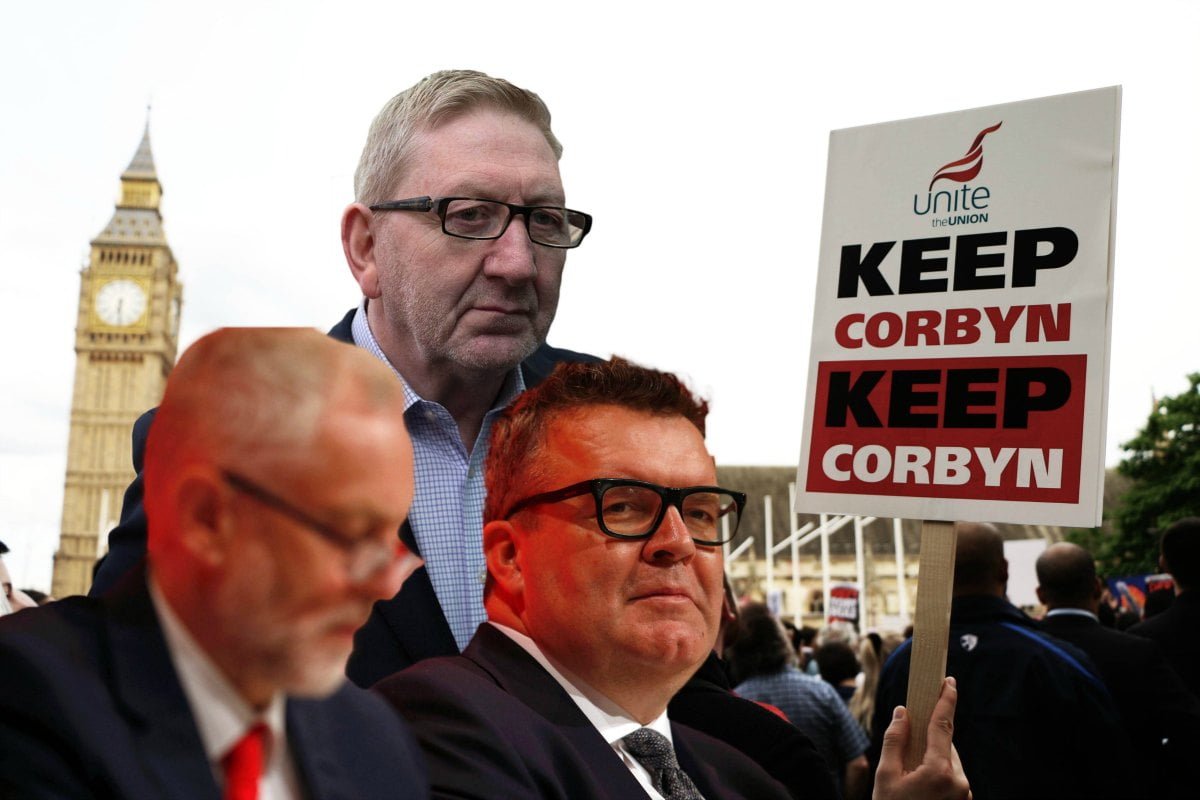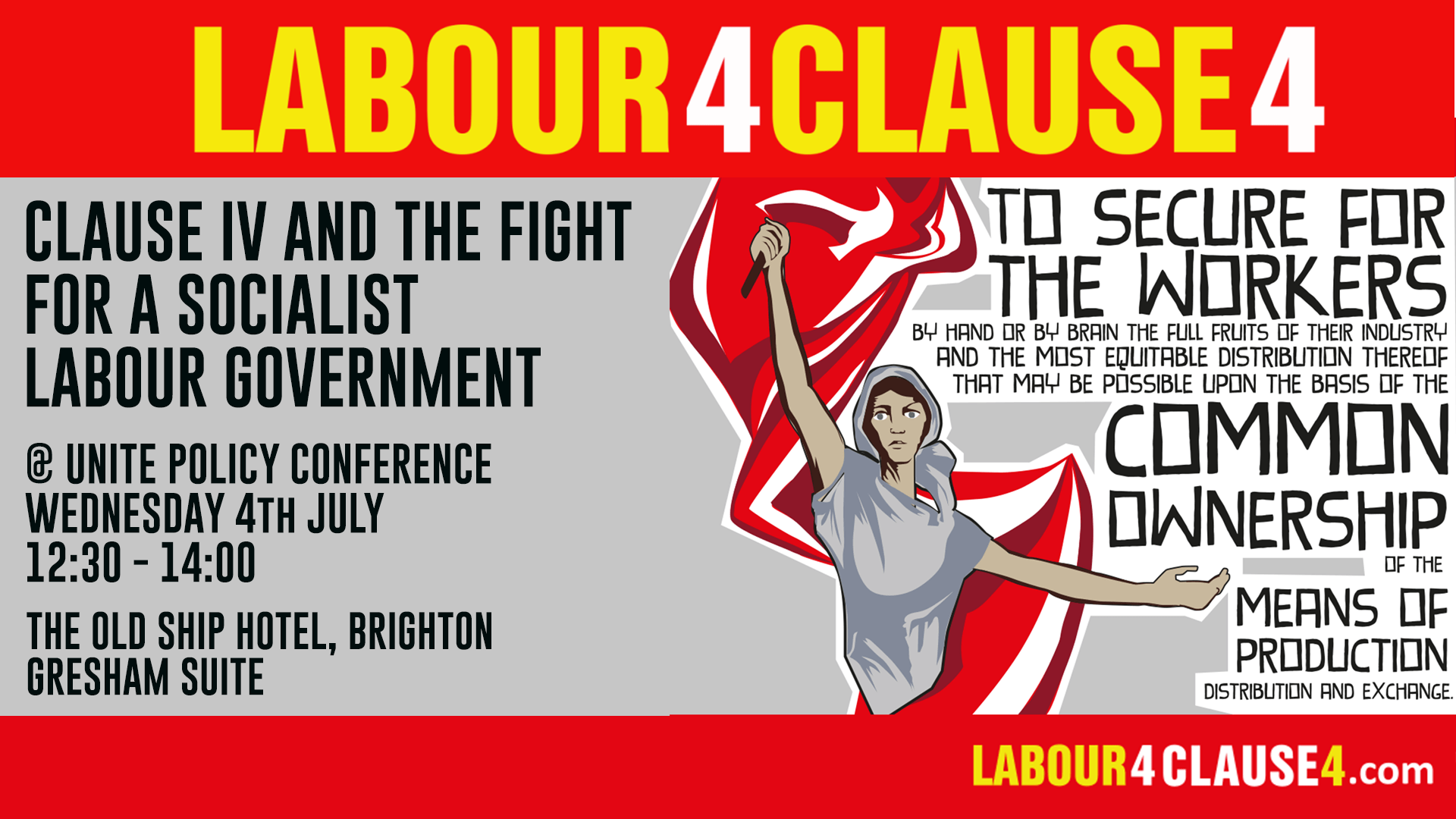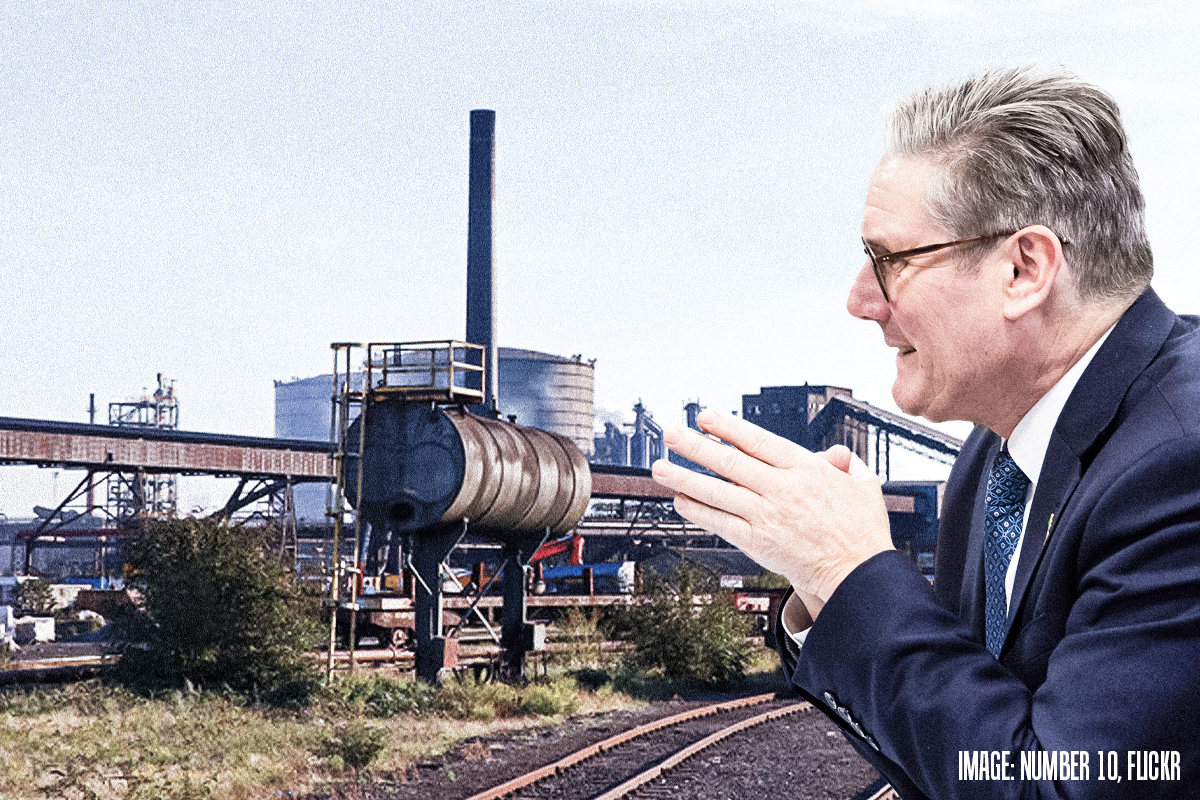Unite the Union has an enormous influence inside the Labour Party. It should use this to kick out the Blairites and push for bold socialist policies.
Hundreds of delegates from Britain’s largest trade union will be gathering in Brighton this week for the 2018 Unite policy conference. On the agenda will be a range of motions covering the union’s industrial strategy and economic demands. But equally important as these will be the debate around the union’s political strategy and its relationship with the Labour Party.
Join Socialist Appeal activists in Brighton this week at the Labour4Clause4 campaign fringe meeting to discuss the way forward in the fight for a socialist Labour government.
CLAUSE IV AND THE FIGHT FOR A SOCIALIST LABOUR GOVERNMENT
Wednesday 4th July
12:30 – 14:00
The Old Ship Hotel (Gresham Suite), Brighton
Unite’s influence within the Labour Party is an open secret. It is the single largest donor to the Party, providing over £11 million since Jeremy Corbyn was elected as leader, including £4.5 million for the last general election campaign.
With 1.4 million members, it is also the largest affiliated union to the Labour Party. As a result, Unite holds two places on the Labour National Executive Committee (NEC).
Winning Labour for working people
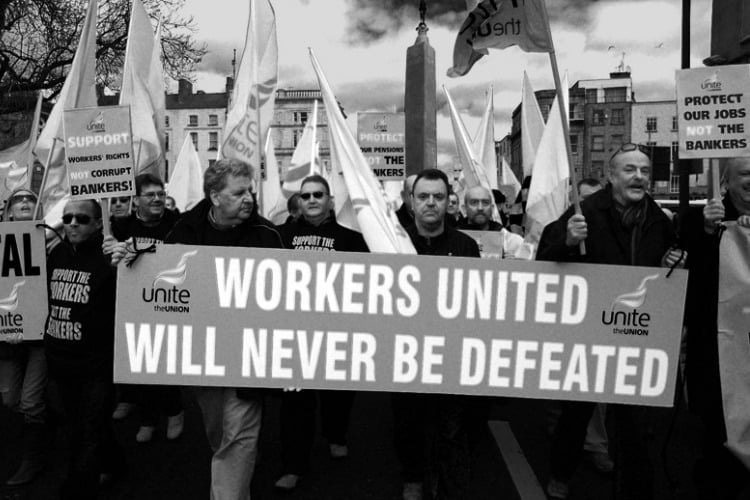 But the links between Unite and Labour extend far beyond money and positions.
But the links between Unite and Labour extend far beyond money and positions.
At the top, the union has provided key figures within the Corbyn team: from Andrew Murray, the chief of staff at Unite, who is now a special political advisor to Jeremy Corbyn; to Jennie Formby, the former political director for Unite and now the general secretary of the Labour Party, as of April this year.
And of course there is Len McCluskey, the Unite general secretary, who undoubtedly has a direct line to the Labour leader’s office.
At the grassroots level, meanwhile, Unite members have the potential to play a decisive role in the Party. For years now, the union has had a political strategy of encouraging members to get active in the Labour Party at all levels, with the aim of sending thousands of union activists into the Party to advance trade union policies.
As part of this campaign, Unite provide regular political schools and training to educate members and help them navigate the labyrinthine structures of the Party. They are actively on the lookout for trade unionists who can go on to represent working class interests as councillors and MPs. Indeed, it is estimated that over two-thirds of current Labour MPs have links to Unite.
As the official Unite slogan neatly summarises, the union’s aims are: winning Labour for working people; and winning working people for Labour.
Kingmakers
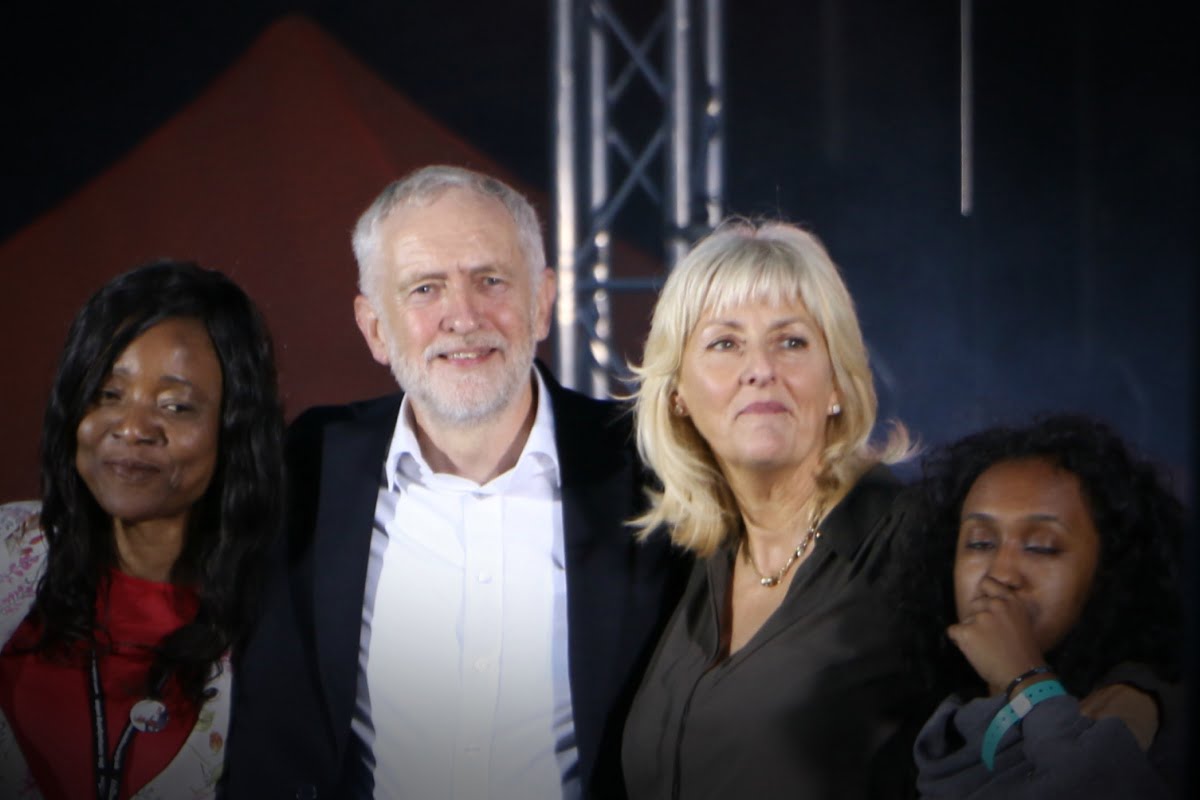 At times, Unite’s backing has proved to be vital for the Corbyn movement. In the first leadership election, in 2015, for example, the union’s executive council endorsed Jeremy Corbyn and encouraged members to give him their no.1 vote.
At times, Unite’s backing has proved to be vital for the Corbyn movement. In the first leadership election, in 2015, for example, the union’s executive council endorsed Jeremy Corbyn and encouraged members to give him their no.1 vote.
And in the darkest hour, at the time of the Blairite “chicken coup” in June 2016, it was thanks to pressure from delegates at the last Unite policy conference that Len McCluskey was forced to come out in support of Corbyn and against the Machiavellian maneuvers of deputy leader Tom Watson.
Indeed, such was the disgust amongst union members towards the intrigues and shenanigans of the Blairites at the time, that the Unite executive – including McCluskey – had to reluctantly back a motion at the 2016 policy conference calling for the mandatory reselection of Labour MPs.
It is clear, therefore, that Unite the Union is a – if not the – major player in the Labour movement. Momentum is often portrayed in the mainstream media as being Corbyn’s Praetorian Guard and has developed a vast network of activists through social media and local groups to this effect.
But as the battle for general secretary of the Labour Party earlier this year demonstrated, when Momentum boss Jon Lansman took on the Unite-backed Jennie Formby, it is McCluskey’s union that is really the kingmaker.
Thus far, Unite’s influence within the Labour Party has generally been used to good effect. Not only has the union been a key backer of Corbyn’s leadership but it has no doubt been a major driver in the adoption of left-wing policies, such as the call in the Labour manifesto for renationalisation of the railways and utilities.
Kick out the careerists
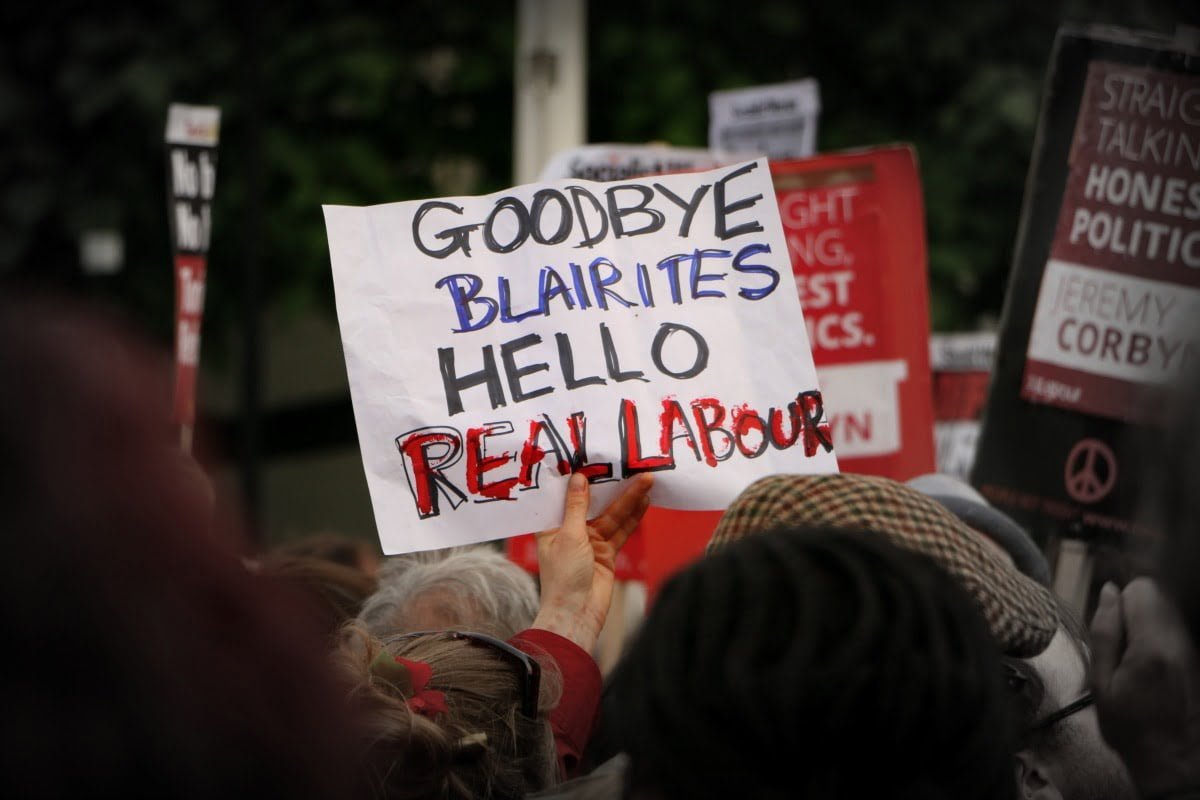 As mentioned already, however, Unite’s positive role in the Corbyn movement has often come about in spite of the union’s leadership, not because of them.
As mentioned already, however, Unite’s positive role in the Corbyn movement has often come about in spite of the union’s leadership, not because of them.
For example, it is suspected that McCluskey himself was not initially in favour of the underdog backbencher Corbyn in the first Labour leadership election (in 2015), but would have prefered the more established candidate of Andy Burnham. This was in keeping with the previous Unite backing given to Ed Miliband in the 2010 leadership contest, over the more left-wing alternative of Diane Abbott.
And more recently, the Unite general secretary admitted in a long article for the New Statesmen that:
“I am personally not in favour of mandatory reselection; I believe our present procedures for holding MPs to account are quite sufficient. However, I lost that argument overwhelmingly with the Unite executive council and at our policy conference in 2016 in the wake of the misjudged and cowardly coup against Corbyn by most of the Parliamentary Labour Party (PLP).”
The task for Unite members now is to ensure that this previously agreed policy is seen through. McCluskey has correctly come out against the treachery and sabotage of the Blairites on many recent occasions. The necessary conclusions must be drawn from seeing this consistent behaviour.
The recent smears, attacks and hysteria of the Labour right-wing against Corbyn over anti-semitism, Russia and Brexit show that these ladies and gentlemen will never stop in their attempts to squash the Left.
These Blairite MPs are a cancer in our Party – a tumour that is slowly killing our movement. We need to kick these careerists out and replace them with those who will instead fight for the interests of trade unionists and the working class.

